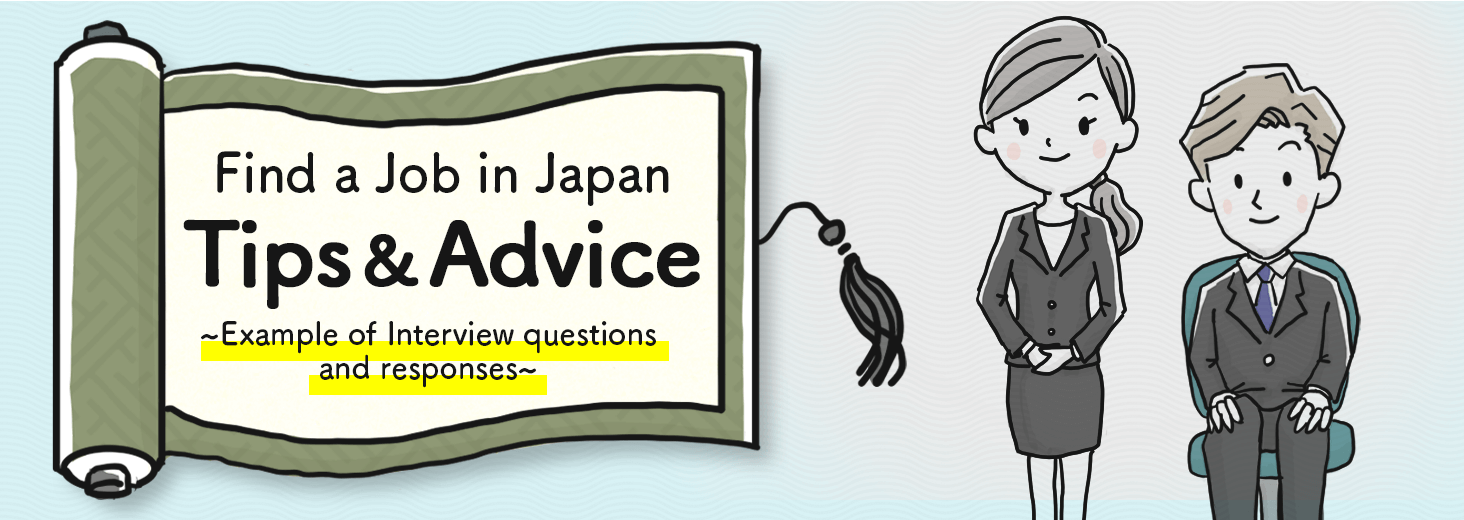Work in Japan Advice Board


- Jobs in Japan @ Daijob.com
- Working in Japan Advice Board
- Examples of Interview Questions and Responses

3. Examples of Interview questions and responses
The following are common questions that are often asked during interviews for mid-career positions. It is very important to understand the intent of the interviewer when answering the question in order to make the interview successful. Be sure to thoroughly prepare for your interview to increase your chances.
- Why did you want to change jobs?
-
If you express dissatisfaction with your current position, the interviewers might think that you may quit again if you feel dissatisfied after joining the company. Think about the way in which your words are expressed, and translate negative things into positive conclusions.
For example, let's tell you a clear goal: "I can't do it," → "I'd like to grow in the area of △△Be aware of focusing on your future and development!
- Please tell us why have you applied to our company.
-
Answer this question based on your reasons for changing jobs. Ensure that you study the company and the position beforehand to make your answer even better.
Consider answering your own aspirations and objectivity for persuasive reasons!
- What are your greatest achievements?
-
This is a good question to show off your achievements. Take this opportunity to shine and make yourself stand out. Try to discuss things you have done that you are proud of but that will also be relevant to the organization or position you are applying for. Talk about your achievements, how you achieved them and what was achieved, preferable in numeric values.
It is important to answer not only the results of the numbers, but also the processes such as "How did you have a track record?" and "Why did you succeed?"
- What are some failures you have experienced?
-
This question is the opposite of the above achievements question. Discuss why you think you failed, what you learned and what improvements have you made since then.
Let's emphasize cause, effect, action and efforts to prevent recurrence!
- When do you feel motivated by your work?
-
Candidates who change jobs are expected to be work-ready right away. It is important to understand wht kind of people the company is looking for and talk about yourself while keeping this in mind.
Let's use past examples to create an image of how your presence leads your company to success!
- If hired, what are the experiences and skills that you can leverage?
-
This is a question for interviewers to understand the applicants motivation to work and their compatibility. Answer this question by using your actual experiences so far, however, it is important to note that you might be asked if you can feel the same satisfction in the company that you are applying for.
If you can, share a story that will make the interviewers believe that you will be a great fit for the company.
- Tell us what we know about our services and products.
-
Before interviewing for a company, it is important to deepen your product knowledge through the official page of the company and to get a sense of the market through reviews by users. Rarely, you may be asked "What kind of improvement would you make?" so you should prepare your own answers, keeping in mind not to talk about the company's lacking points too much.
Talk about the company's products and services and your willingness to deepen your knowledge about them as if you are already a member of the company.
- What challenges do you want to take on if hired?
-
This is also a question to confirm the enthusiasm of the candidate. Be careful not talk only about what you want to do, but also about how you can contribute to the company by taking on challenges.
By describing why you want to take on certain challenges, what actions you will take and how you will go about the job to achieve the best results, you can demonstrate your logical thinking abilities.
- Please tell us about your career plan.
-
The key point is whether you have formulated a medium to long-term plan based on what you want to take on. Employers hope that the employees will work for a long time after joining the company, so they are checking how the applicants envision their future after joining the company and whether the plan is feasible at their company. Same as with the motivation and reasons for changing jobs, candidaes who respond while keeping the company's ideals and growth speed in mind might have a higher chance at being hired.
Let's talk about your career plan in 5 and 10 year intervals and also talk about what you will do after it is accomplished.
- Are there any other companies you have applied for?
-
There in no problem with an honest answers, but be careful in case the industry or job type that you are applying for is too different or inconsistent with the one you are being interviewed for. It is better to keep the answers a bit ambiguous, such as the number of companies you are applying for (e.g., about 2 or 3 companies) or that the results have not yet been announced.
If you apply to more than one company, be aware of the relationship with the company you interview with.
- Will you join us if you get a job offer?
(Is our company your first choice?) -
This is a question that encourages employees to join the company. If you want to be first, you should tell you that, but if you don't want to be first, you don't have to lie. However, please give a positive answer.
This is a question that encourages employees to join the company. If the company is your first choise, you should definately say so, but in case it is not, there is no need to lie. However, it is good to give a positive answer.
- What is the desired annual income?
-
This is important question to see if you and the employers criteria match in regards to compensation. If your desired annual salary is much higher than that of the current employees, it may be difficult to hire even the most talented personnel.
Answer the numbers that are convincing whether you are objectively looking at your own values based on your current income or understand the market quotations!
- When can you join the company?
-
Make a desired schedule at the time you begin your career change. If you are working, you should consult with the employee based on the specific period required for the transfer, and if you are unemployment, you should say that you are able to do so at any time, unless there are special circumstances. Employees who are working are generally hired within one to two months after being receiving a job offer.
To the extent possible, it is important to show an attitude to ensure that employees are able to join the company as soon as possible.
- Do you have any questions?
-
At the end of the interview, this question is frequently asked. If you answered "Not in particular" it may be seen as you are not so prepared or interested. Be careful not to ask any questions that might leave a negative impression, such as questions that could be answered by having a look at the official page or about overtime hours.
Ask ambitious questions about your work and your employees!
- Can you work under pressure?
-
Give a positive answers to the question "Yes" and then answer with specific examples of "Why do you feel you can handle pressure?" and "Under what circumstances are you strong under pressure?"
Logical explanations based on actual experiences make a strong impression.
- Are you satisfied with your career?
-
Avoid negative expressions that deny past experiences by responding "Yes" with a self-affirmative feeling.
Explain your possibilities by saying, "I'm satisfied, but I want to grow even more in the thousands of parts!"
- What do you feel dissatisfied with your current position?
-
You need to be careful when answering this question. Make sure that the dissatisfaction you have with your current position does not occur at the company you are applying for. It is good to give facts from a bird's-eye perspective, such as the size of the current company and the length of decision-making by the company.
Be sure to turn negatives into positives, such as how to deal with them and how to think about them!
- What do colleagues and others say about you?
-
Its good to prepare several examples.
Prepare examples that convey your attitude.
- Why should we hire you?
-
Answer how your values and skills match the company's requirements.
Argue how you can leverage your strengths and how you can contribute to the company.



